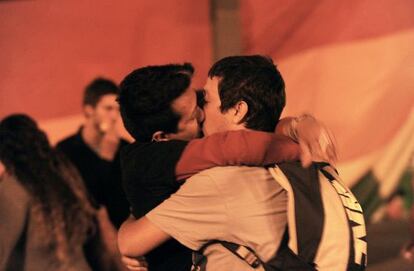Uruguay¡¯s love law
Nation becomes second in Latin America to approve same-sex marriage


Uruguay has become the 12th country in the world, and the second in Latin America, to approve same-sex marriage. Uruguayan law will no longer state that marriage must be between ¡°a man and a woman¡± but instead between partners.
The new law was first approved by the Chamber of Deputies in December, but it still had to be ratified in the Senate with 23 lawmakers in the upper chamber voting in favor of it and eight against. It went back to the lower house with minor changes and the final version was approved late Wednesday with 71 of the 92 members present voting in favor.
People attending Wednesday night¡¯s session shouted ¡°Equality, equality, equality!¡± when the vote was held.
The final version still has some drafting errors that will be corrected in the coming days, but this technicality doesn¡¯t stop Uruguayans of the same sex from getting married in the meantime.
How does my neighbor¡¯s freedom to marry affect my own rights?"
¡°I have had a lot of phone calls from people who are really excited,¡± said Federico Gra?a, a deputy from President Jos¨¦ Mujica¡¯s leftist Broad Front (FA) coalition grouping and a gay-rights activist. ¡°And when you think about it, there are also a lot of people who haven¡¯t called.¡±
The new law also permits married persons of the same sex to adopt and allows them to choose which last name their children will carry.
Gra?a believes that the Uruguayan law is much broader than the same-sex marriage laws passed in Spain and Argentina. ¡°Thanks to Argentina and Spain we have been able to learn from the procedures in those countries. People and activists such as the \[Spanish\] Socialist Pedro Zerolo and some Argentineans came to Uruguay to advise us on how to go about doing this. Their cooperation was very important.¡±
Spain passed same-sex marriage in 2005 under Prime Minister Jos¨¦ Luis Rodr¨ªguez Zapatero¡¯s Socialist government. The law was upheld by the Constitutional Court earlier this year. In Argentina, the Peronist government of President Cristina Fern¨¢ndez de Kirchner introduced a homosexual marriage law in July 2010.
Nevertheless, the Catholic Church in Uruguay stood firmly against the bill. Church leaders recalled the words of Pope Francis I when he was archbishop of Argentina during that country¡¯s debate over gay marriage.
¡°We are playing with the identity and survival of the family ¡ª in other words, father, mother and children... This could seriously hurt the family; this could destroy God¡¯s plan,¡± said the then-Cardinal Jorge Mario Bergoglio.
Nevertheless, there was a low turnout at Tuesday¡¯s demonstration against the bill, which was organized by Uruguay¡¯s Catholic Church .
¡°This isn¡¯t a law against anyone,¡± said FA deputy Jorge Orrico. ¡°It only recognizes certain situations that society once swept under the carpet. If people are able to choose their own sexual preference in a way that doesn¡¯t trample on the rights of others, then you have to ask the question: How does my neighbor¡¯s freedom to marry a man or a woman affect my own rights? In no actual way. But for centuries we have been pressured by traditional values, many of them stemming from religion.¡±
Nevertheless, conservative deputies like Luis Alberto Lacalle ¡ª an ex-president who served from 1990 to 1995 and a former leader of the National Unity party ¡ª actively campaigned against homosexual marriage. ¡°Laws shouldn¡¯t be allowed to change labels,¡± he told the Montevideo daily El Pa¨ªs last week. He has also come out against allowing homosexual couples to adopt. ¡°The basic concept is to give a child a family, not give a family a child. That is why I don¡¯t think it is right to give couples of the same sex the right to adopt.¡±
The idea is to give a child a family, not give a family a child"
However, opposition parties allowed their members to vote according to their conscience. Jos¨¦ Carlos Cardozo of National Unity voted in favor: ¡°During the last part of the 20th century, there was a lot of debate over civil rights in Uruguay, but then this all came to a halt when gay marriage cropped up. Society has changed, and the only thing Congress has done is recognize certain situations. It has been two years since we recognized out-of-wedlock relationships and the rights those couples have. But in reality those types of relationships have been going on for more than 30 years.¡±
Besides Spain, gay marriage is recognized in the Netherlands (since 2001); Belgium (2003); Canada (2005); South Africa (2006); Norway and Sweden (2009); Portugal, Iceland and Argentina (2010); and Denmark (2012). It is also legal in six of the 50 states in the United States and in Mexico City, the Mexican state of Quintana Roo and the Brazilian state of Alagoas.
Tu suscripci¨®n se est¨¢ usando en otro dispositivo
?Quieres a?adir otro usuario a tu suscripci¨®n?
Si contin¨²as leyendo en este dispositivo, no se podr¨¢ leer en el otro.
FlechaTu suscripci¨®n se est¨¢ usando en otro dispositivo y solo puedes acceder a EL PA?S desde un dispositivo a la vez.
Si quieres compartir tu cuenta, cambia tu suscripci¨®n a la modalidad Premium, as¨ª podr¨¢s a?adir otro usuario. Cada uno acceder¨¢ con su propia cuenta de email, lo que os permitir¨¢ personalizar vuestra experiencia en EL PA?S.
?Tienes una suscripci¨®n de empresa? Accede aqu¨ª para contratar m¨¢s cuentas.
En el caso de no saber qui¨¦n est¨¢ usando tu cuenta, te recomendamos cambiar tu contrase?a aqu¨ª.
Si decides continuar compartiendo tu cuenta, este mensaje se mostrar¨¢ en tu dispositivo y en el de la otra persona que est¨¢ usando tu cuenta de forma indefinida, afectando a tu experiencia de lectura. Puedes consultar aqu¨ª los t¨¦rminos y condiciones de la suscripci¨®n digital.








































